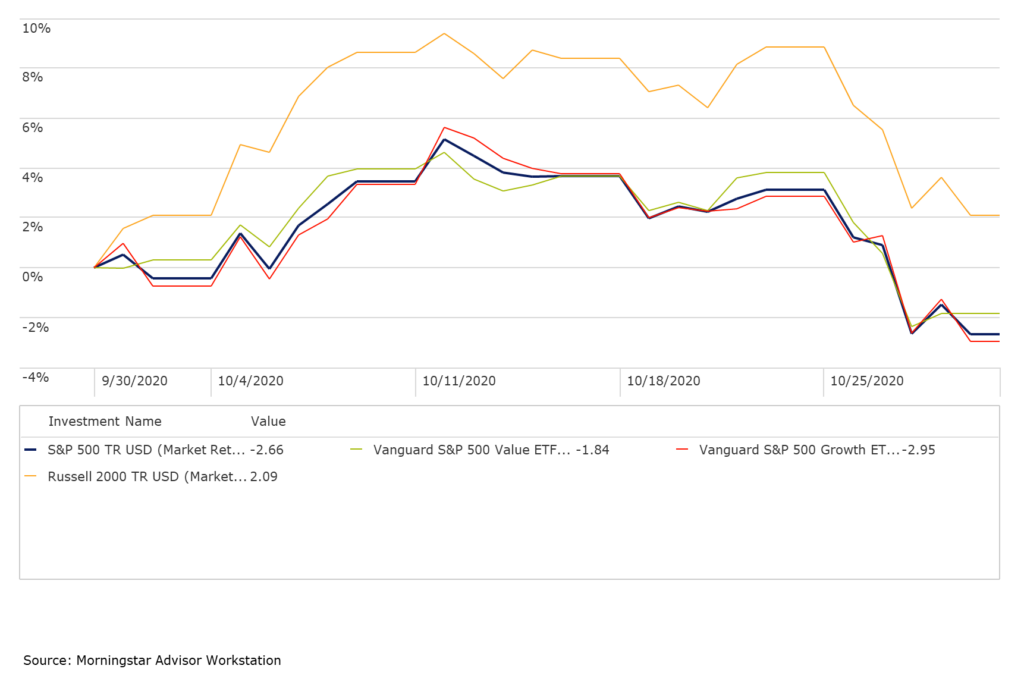October Market Review
By Clint EdgingtonPosted on November 2nd, 2020
Writing these market reviews is a humbling experience and solidifies our hesitance to predict what markets will do in the short term. Most months, it’s easy to discern why the various markets performed the way they did. But for some months, such as last month, once you get behind the headlines it becomes more difficult to tease out the why when you look at different markets that appear to diverge from a narrative. It’s simple to calculate what the returns were, but difficult to discern the why. And this is, in effect, predicting the why for what’s already occurred. Any market prediction we’ve ever heard always states “due to X, we believe the market will do Y”; which is a heck of a lot more difficult proposition when you’re looking into the future.
It’s difficult to remember that the equity markets (all markets, really) are impacted by all market participants; which include a broad array of actors with different time horizons, tax situations, etc. For example, for a taxable long term investor, a Biden victory would likely usher in things that would negatively impact forward earnings for a given investment in a stock (higher capital gains tax rates at the personal level, higher corporate tax rates, etc.); offset by positives (likely higher fiscal stimulus, etc.). For a high frequency trader, their time horizon is judged in milliseconds, and none of those factors apply. For a pension fund, capital gains rates don’t matter. Generally, and especially this year during these politically divisive times, it’s helpful to attempt to keep our political beliefs at bay when it comes to investing. What may impact your situation, or your political beliefs, may or may not impact the market in the aggregate.
Economic activity was generally positive this month; 3rd quarter GDP rebounded by 33% from Q2‘s historical plunge of 31%[1]; reinforcing the idea that Q2’s drop was partially temporary. Earnings season kicked off with generally positive earnings, with 81% of reporting companies beating expectation. FactSet models earnings for the S&P 500, and their model adjusted to show a 9.8% profit decline for the year vs. a 20% drop prior to earnings season.
On its face October seems straightforward; U.S. equity markets started the month off on a tear and it can likely boiled down to;
- Presidential Elections – The markets like certainty, and a Biden victory seemed fairly safe.
- Stimulus – Hopes of further stimulus were still alive.
- COVID-19 case counts – Seemed to maintain a plateau.
The back half the month shed those gains plus some; culminating in last week being the worst week since March. This can likely be boiled down to:
- Presidential Elections – Biden’s victory became less clear, but what did become clear is that there will likely be no certainty in the election this Tuesday and perhaps not this week.
- Stimulus – Hopes of immediate stimulus were dashed when the Senate went home after confirming Amy Coney Barrett to the Supreme Court
- COVID-19 case counts – Cases began rising again, stoking fears of further restrictions.

Yet why did the IT Sector lead the losses? Why didn’t Small Cap stocks give back all of their gains? Why did the market ignore a slew of generally positive economic data?
My guess is that a subset of taxable investors likely feel the increased volatility in the markets, and they fear the political outcome and/or fear the increase in capital gains tax rates that seem likely with a Biden victory and decided to book gains where they have them; which is in IT and more “growth” areas of the market.

The bond market declined as the
10 Year note yield rose from .7% to .86%.
All else equal, a selloff in the equity market many times rotates into
safer havens such as the treasury market; which would push yields down. Curiously, this did not occur. Perhaps the offsetting impact of future
fiscal stimulus becoming clearer under both presidents (generally inflationary)
made fixed income participants shorten the terms of their bonds to decrease the
risk of inflation as we saw the yield curve steepen (longer term bonds sold
off).
As in many aspects of life in 2020, this market review has more uncertainty than most; crystallizing our notion that markets are not meant to be timed, long term investors should maintain a long term horizon, and planning for your personal investment and tax circumstances should trump any short term views of the market. If you have questions about your investments or financial planning, please contact us to set an appointment. The last two months of the year are always busy for us, and we imagine this year will be more so as we work on decreasing client’s taxes, deferring capital gains, and positioning our clients for long term success.
[1] Keep in mind these are annualized figures and an increase of 33% annualized after a drop of 31% does not get you back to even.